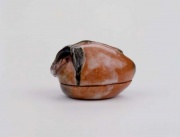Difference between revisions of "Bloom"
Jump to navigation
Jump to search
| (2 intermediate revisions by 2 users not shown) | |||
| Line 1: | Line 1: | ||
| − | [[File:Image3_802418.jpg|thumb| | + | [[File:Image3_802418.jpg|thumb|Incense box<br>MFA# 18.243a-b]] |
== Description == | == Description == | ||
| − | A waxy, cloudy or powdery haze that appears on the surface of paint, varnish, leather, ink, metal, or plastic. For any material the bloom may be due to the deposition of atmospheric pollutants such as [[ammonium sulfate]]. For individual materials the following explanations have been given: | + | A waxy, cloudy or powdery haze that appears on the surface of paint, varnish, leather, ink, metal,concrete, glaze, or plastic. For any material, the bloom may be due to the deposition of atmospheric pollutants such as [[ammonium sulfate]]. For individual materials the following explanations have been given: |
| − | + | * Varnish: trapped or condensed moisture often due to varnish application in humid conditions. Wax-based media may also produce blooms on varnish. | |
| − | + | * Paint: exudation of organic salts formed by reactions of the oils components with pigments or driers (Ordonez and Twilley, 1998). | |
| − | + | * Plastic, rubber or ink: exudation of additives (plasticizers, lubricants, antistatic agents, waxes, etc.) or unreacted monomers. | |
| − | + | * Leather: [[ellagic acid]] crystallization after tanning with some pyrogallol type vegetable tannins, such as [[myrobalan%20extract|myrobalan]], [[valonia]], and [[divi-divi]]. | |
| − | + | * Metal: trace impurities that crystallize on the surface after casting. | |
| − | + | * Photographic plate: dried residues from tap water. | |
| − | |||
| − | |||
| − | |||
| − | |||
| − | |||
== Synonyms and Related Terms == | == Synonyms and Related Terms == | ||
| Line 20: | Line 15: | ||
haze; efflorescence; chill; blush | haze; efflorescence; chill; blush | ||
| − | == | + | == Resources and Citations == |
| − | |||
| − | |||
| − | + | * E. Ordonez and J. Twilley, "Clarifying the Haze" ''Analytical Chemistry'', 69,:416 (1997). | |
* Reed Kay, ''The Painter's Guide To Studio Methods and Materials'', Prentice-Hall, Inc., Englewood Cliffs, NJ, 1983 | * Reed Kay, ''The Painter's Guide To Studio Methods and Materials'', Prentice-Hall, Inc., Englewood Cliffs, NJ, 1983 | ||
Latest revision as of 16:20, 8 May 2022
Description
A waxy, cloudy or powdery haze that appears on the surface of paint, varnish, leather, ink, metal,concrete, glaze, or plastic. For any material, the bloom may be due to the deposition of atmospheric pollutants such as Ammonium sulfate. For individual materials the following explanations have been given:
- Varnish: trapped or condensed moisture often due to varnish application in humid conditions. Wax-based media may also produce blooms on varnish.
- Paint: exudation of organic salts formed by reactions of the oils components with pigments or driers (Ordonez and Twilley, 1998).
- Plastic, rubber or ink: exudation of additives (plasticizers, lubricants, antistatic agents, waxes, etc.) or unreacted monomers.
- Leather: Ellagic acid crystallization after tanning with some pyrogallol type vegetable tannins, such as myrobalan, Valonia, and Divi-divi.
- Metal: trace impurities that crystallize on the surface after casting.
- Photographic plate: dried residues from tap water.
Synonyms and Related Terms
haze; efflorescence; chill; blush
Resources and Citations
- E. Ordonez and J. Twilley, "Clarifying the Haze" Analytical Chemistry, 69,:416 (1997).
- Reed Kay, The Painter's Guide To Studio Methods and Materials, Prentice-Hall, Inc., Englewood Cliffs, NJ, 1983
- Ralph Mayer, A Dictionary of Art Terms and Techniques, Harper and Row Publishers, New York, 1969 (also 1945 printing)
- Theodore J. Reinhart, 'Glossary of Terms', Engineered Plastics, ASM International, 1988
- Richard S. Lewis, Hawley's Condensed Chemical Dictionary, Van Nostrand Reinhold, New York, 10th ed., 1993
- Hermann Kuhn, Conservation and Restoration of Works of Art and Antiquities, Butterworths, London, 1986
- Hoechst Celanese Corporation, Dictionary of Fiber & Textile Technology (older version called Man-made Fiber and Textile Dictionary, 1965), Hoechst Celanese Corporation, Charlotte NC, 1990
- Matt Roberts, Don Etherington, Bookbinding and the Conservation of Books: a Dictionary of Descriptive Terminology, U.S. Government Printing Office, Washington DC, 1982
- Van Nostrand's Scientific Encyclopedia, Douglas M. Considine (ed.), Van Nostrand Reinhold, New York, 1976
- A Glossary of Paper Conservation Terms, Margaret Ellis (ed.), Conservation Center of the Institute of Fine Arts, New York City, 1998
- The American Heritage Dictionary or Encarta, via Microsoft Bookshelf 98, Microsoft Corp., 1998
